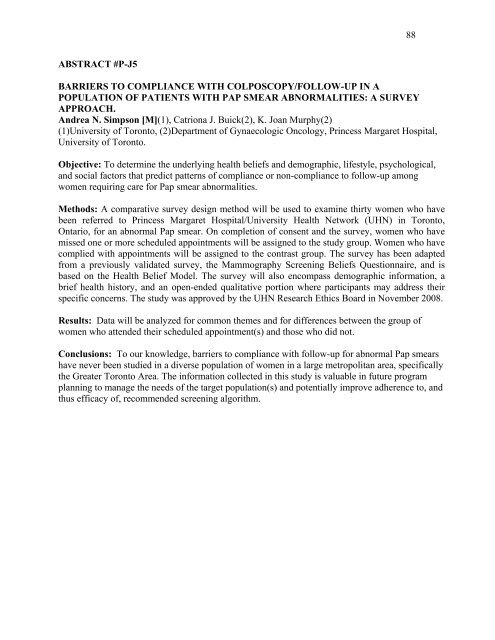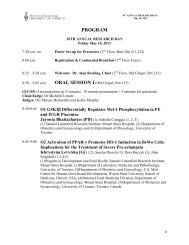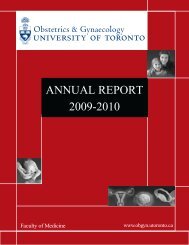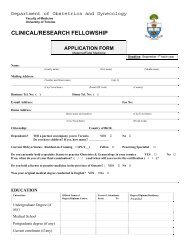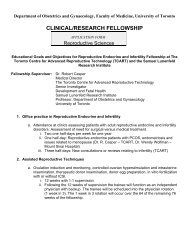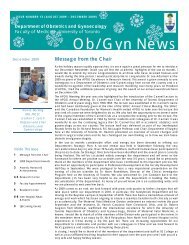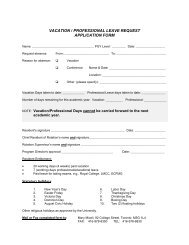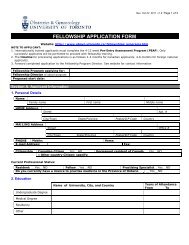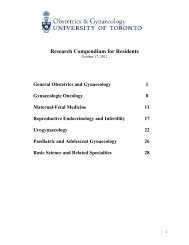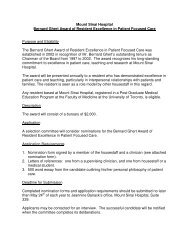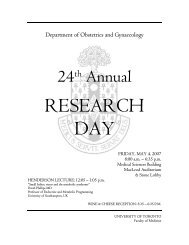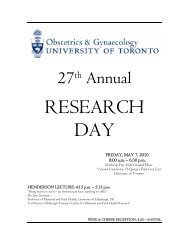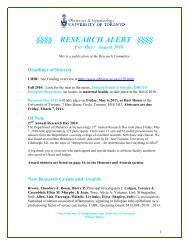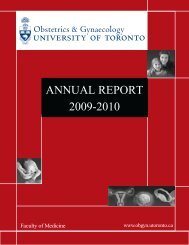research day - University of Toronto Department of Obstetrics and ...
research day - University of Toronto Department of Obstetrics and ...
research day - University of Toronto Department of Obstetrics and ...
You also want an ePaper? Increase the reach of your titles
YUMPU automatically turns print PDFs into web optimized ePapers that Google loves.
88<br />
ABSTRACT #P-J5<br />
BARRIERS TO COMPLIANCE WITH COLPOSCOPY/FOLLOW-UP IN A<br />
POPULATION OF PATIENTS WITH PAP SMEAR ABNORMALITIES: A SURVEY<br />
APPROACH.<br />
Andrea N. Simpson [M](1), Catriona J. Buick(2), K. Joan Murphy(2)<br />
(1)<strong>University</strong> <strong>of</strong> <strong>Toronto</strong>, (2)<strong>Department</strong> <strong>of</strong> Gynaecologic Oncology, Princess Margaret Hospital,<br />
<strong>University</strong> <strong>of</strong> <strong>Toronto</strong>.<br />
Objective: To determine the underlying health beliefs <strong>and</strong> demographic, lifestyle, psychological,<br />
<strong>and</strong> social factors that predict patterns <strong>of</strong> compliance or non-compliance to follow-up among<br />
women requiring care for Pap smear abnormalities.<br />
Methods: A comparative survey design method will be used to examine thirty women who have<br />
been referred to Princess Margaret Hospital/<strong>University</strong> Health Network (UHN) in <strong>Toronto</strong>,<br />
Ontario, for an abnormal Pap smear. On completion <strong>of</strong> consent <strong>and</strong> the survey, women who have<br />
missed one or more scheduled appointments will be assigned to the study group. Women who have<br />
complied with appointments will be assigned to the contrast group. The survey has been adapted<br />
from a previously validated survey, the Mammography Screening Beliefs Questionnaire, <strong>and</strong> is<br />
based on the Health Belief Model. The survey will also encompass demographic information, a<br />
brief health history, <strong>and</strong> an open-ended qualitative portion where participants may address their<br />
specific concerns. The study was approved by the UHN Research Ethics Board in November 2008.<br />
Results: Data will be analyzed for common themes <strong>and</strong> for differences between the group <strong>of</strong><br />
women who attended their scheduled appointment(s) <strong>and</strong> those who did not.<br />
Conclusions: To our knowledge, barriers to compliance with follow-up for abnormal Pap smears<br />
have never been studied in a diverse population <strong>of</strong> women in a large metropolitan area, specifically<br />
the Greater <strong>Toronto</strong> Area. The information collected in this study is valuable in future program<br />
planning to manage the needs <strong>of</strong> the target population(s) <strong>and</strong> potentially improve adherence to, <strong>and</strong><br />
thus efficacy <strong>of</strong>, recommended screening algorithm.


